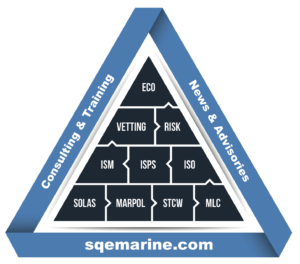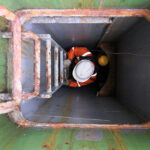Overview
Paris and Tokyo MoUs on PSC will launch a joint Concentrated Inspection Campaign (CiC) from 1st September 2024 to 30th November 2024 on Crew Wages and Seafarer Employment Agreement (SEA) under MLC. Other MoUs may participate also in the campaign. This inspection campaign will be additional to the regular PSC inspections.
Aim of CIC
The purpose of the Inspection Campaign is to determine the level of compliance of all involved parties with the requirements of the Maritime Labor Convention, 2006 (MLC, 2006), especially those related to Crew Wages and Seafarer Employment Agreement.
Questionnaire
A CIC questionnaire will be used to facilitate adequate preparation of those involved. In accordance with the released information, a 10 – question checklist covering the functionality and smooth flow of Crew Wages and Seafarer Employment Agreement is included.
See Appendix A for CIC Questionnaire.
Actions required
Managers, manning offices, officers, and crew onboard should be prepared to successfully address the PSC CiC. Crew departments must verify that all relevant documentation for onboard crew is available to the Master for presentation to the PSCO. Allotments and wage payments should comply with the requirements of the Seafarer’s Employment Agreement. Wage or salary payments to seafarers must be made at intervals no greater than monthly. Each crew member should have an original copy of their SEA ready for inspection by the PSCO.
How we may help
SQEMARINE can provide guidance for CiC Questionnaire (Appendix A), prepare the response to questionnaire (Appendix B) and provide SEA and Wages PSC Deficiency code analysis Globally (Appendix C).
Appendix A: Inspection Questionnaire
| No. | Description | Yes | No | Detention |
| 1. | Is the Seafarers’ Employment Agreements (SEA) signed by both the seafarer and the shipowner or a representative of the shipowner?? | |||
| 2. | Is the seafarer able to access information regarding their employment conditions on board? | |||
| 3. | Are standard forms of SEAs and parts of any applicable collective bargaining agreements, subject to Port State Control (PSC) inspections under Reg. 5.2, available in English? | |||
| 4. | Does the SEA include all the required elements specified in the MLC 2006 Standard? | |||
| 5. | Do particulars included in the seafarers’ employment agreement comply with MLC, 2006 requirements? | |||
| 6. | Are wage or salary payments made to the seafarer at no greater than monthly intervals? | |||
| 7. | Have seafarers been given a status of accounts and wages paid on at least a monthly basis? | |||
| 8. | Are wage or salary payments in accordance with any applicable CBA or SEA? | |||
| 9. | If payments made to a seafarer include deductions, are they in accordance with MLC Convention? | |||
| 10. |
|
Appendix B: Best Practice Guidance on Inspection Campaign Questionnaire
1. Is the Seafarers’ Employment Agreements (SEA) signed by both the seafarer and the shipowner or a representative of the shipowner?
The shipowner’s company or manning agency, upon completing a mutually accepted employment agreement with the seafarer, must issue original SEA copies signed by both parties for the agreement to be valid. Both the Master and the seafarer must possess a valid copy each and should be prepared to provide it to inspectors upon request. Embarkation of a seafarer should not be allowed if the SEA documentation is invalid (unsigned) or not presented. Frequent checks are recommended to avoid expired agreements.
2. Is the seafarer able to access information regarding their employment conditions on board?
To ensure seafarers have access to information regarding their employment conditions, they must be provided with relevant documentation (hard copies or electronic records) upon signing their SEA. The Master should also maintain an electronic folder with this documentation, beginning with the MLC 2006. The managing company should inform the personnel on board of any updates to the employment conditions. Free internet on board enhances the seafarers’ ability to directly access relevant legislation and provisions.
3. Are standard forms of SEAs and parts of any applicable collective bargaining agreements, subject to Port State Control (PSC) inspections under Reg. 5.2, available in English?
Employers preparing the SEA should write its standard form and any portions of a collective bargaining agreement contained within the standard form in English. They must then provide this to the Master and the seafarer before the latter commences their duty on board. This version must be maintained in the ship’s records, and it must be clear to all involved parties that the initial embarkation of the seafarer is prohibited if an English version of the documentation is not available.
4. Does the SEA include all the required elements specified in the MLC 2006 Standard?
Employers preparing the SEA should ensure that the required elements [(a) to (e)] of Standard A2.1(1)/MLC 2006 have been satisfied and recorded. Seafarers should also ensure that they possess an original copy of their SEA. Their embarkation should not be allowed if the documentation is not presented to the Master in time.
5. Do particulars included in the seafarers’ employment agreement comply with MLC, 2006 requirements?
Employers preparing the SEA should ensure that the particulars [(a) to (k)] incorporated into Standard A2.1(4)/MLC 2006 are satisfied and recorded. Seafarers should also check for the inclusion of these particulars in their SEA before signing it. If any of the required elements are missing, their embarkation should not be allowed.
6. Are wage or salary payments made to the seafarer at no greater than monthly intervals?
According to the provisions in Standard A2.2(1)/MLC 2006, employers or the managing company should deposit wages to seafarers on a monthly basis, or at intervals mutually agreed upon in bargaining agreements. Seafarers should check the transactions in their accounts. In case of any deviations from those agreed in the SEA [based on Standard A2.2(1)/MLC 2006], they must proceed in accordance with the provisions of Guideline B2.2.2(4)(L)/MLC 2006 and submit relevant claims, especially when deposits are made beyond monthly intervals.
7. Have seafarers been given a status of accounts and wages paid on at least a monthly basis?
Employers or the managing company are encouraged to officially notify seafarers (e.g., an email to the ship’s address with bank receipts, cheques, postal cheques, or money orders attached, and/or corresponding hard copies provided by the agents at the port of call) about their monthly wage payments. Seafarers should then check their accounts. In case of any discrepancies from those agreed upon in the SEA [Standard A2.2(1)/MLC 2006], they must proceed to submit claims, especially when deposits are made beyond monthly intervals.
8. Are wage or salary payments in accordance with any applicable Collective Bargaining Agreement (CBA) or SEA?
Employers or the managing company must send seafarers bank receipts, cheques, postal cheques, or money orders for their wages (via email or through the agent at the port of call) at appropriate intervals and translated into a language the seafarer understands, to certify that payment procedures follow the provisions provided in the CBA or SEA (agreed amount of money, time intervals between payments, type of financial transaction requested as per Guideline B2.2.2 (4)(f)/MLC 2006, etc.).
9. If payments made to a seafarer include deductions, are they in accordance with MLC Convention?
In the case of potential deductions from seafarers’ payments that are included in national laws/regulations or an applicable collective agreement and do not exceed predefined limits [Guideline B2.2.2(h)(ii)], employers or the managing company must officially justify these deductions and inform the seafarers accordingly. The justification should be recorded in the ship’s records and be easily accessible to all involved parties and Port State Control Officers (PSCOs).
10.A. Is a certificate or documentary evidence of financial security, issued by the financial security provider, available on board in the event of compensation for death and long-term disability?
The shipowners or managing company must provide all involved parties (the master and entities responsible for handling seafarers’ contractual claims) with written evidence of financial security regarding compensation for a crew member’s death or long-term disability. The information described in Appendix A4-I/MLC 2006 must be included in this evidence. A copy of the evidence must be maintained in the ship’s records in English (as well as in a language that the seafarer understands) in a conspicuous place where it is readily available to the seafarers [Standard A2.5.2 (6)/MLC 2006].
10.B.Is a certificate or documentary evidence of financial security, issued by the financial security provider, available on board in the event of repatriation?
The shipowners or managing company, in alignment with the Declaration of Maritime Labour Compliance Part II, must provide all involved parties (the master and entities responsible for handling seafarers’ contractual claims) with written evidence of financial security regarding the repatriation of a crew member. The information described in Appendix A2-I/MLC 2006 must be included in this evidence, and a copy must be maintained in the ship’s records in English in a conspicuous place for inspectors to access.
Appendix C: Inspection Questionnaire
Deficiency Codes Related to Inspection Campaign
(Source RiSK4SEA)
| No. | Finding | Related PSC codes |
| 1. | Is the seafarer given a SEA signed by both the seafarer and the shipowner or a representative of the shipowner? | 01139, 01140, 01220 |
| 2. | Is the seafarer able to access information regarding their employment conditions on board? | 01220, 01306, 1307, 01308, 01331, 01336, 01337, 09234, 09235, 09236, 18201, 18202, 18203, 18204, 18205, 18299 |
| 3. | Are standard forms of SEAs and parts of any applicable collective bargaining agreements, subject to Port State Control (PSC) inspections under Reg. 5.2, available in English? | 01220, 01221, 01308, 01331, 01336, 01337, 09234, 09236, 18101, 18102, 18201, 18204 |
| 4. | Does the SEA include all the required elements specified in the MLC 2006 Standard? | 01220, 01307, 01308, 01331, 01336, 01337, 09234, 09236, 18101, 18102, 18201, 18202, 18204, 18205, 18299 |
| 5. | Do particulars included in the seafarers’ employment agreement comply with MLC, 2006 requirements? | 01220, 01221, 01331, 01336, 01337, 09236, 18202, 18204, 18205, 18299, 18406 |
| 6. | Are wage or salary payments made to the seafarer at no greater than monthly intervals? | 01139, 01140, 01220, 01221, 01331, 18203 |
| 7. | Have seafarers been given a status of accounts and wages paid on at least a monthly basis? | 01331, 18203, 18204, 18205 |
| 8. | Are wage or salary payments in accordance with any applicable Collective Bargaining Agreement (CBA) or SEA? | 01139, 01140, 01220, 01221, 01331, 18203, 18204 |
| 9. | If payments made to a seafarer include deductions, are they in accordance with MLC Convention? | 01139, 01140, 01221, 01331, 18204 |
| 10. |
|
|
Analysis of SEA & Wages related Deficiency Codes
Last 36 Months (June 2021 – May 2024) Global Statistics
(Source RiSK4SEA)
| Global Rank | DC | Deficiency Code Description | Deficiency Area | # DET Defs | # NON DET Defs | Total DEFs | Share |
| 259 | 01139 | Maritime Labour Certificate | Certificate & Documentation | – | 24 | 24 | 0.16% |
| 282 | 01140 | Declaration of Maritime Labour Compliance (part I and II) | Certificate & Documentation | – | 16 | 16 | 0.11% |
| 30 | 01220 | Seafarers’ Employment Agreement (SEA) | Certificate & Documentation | 247 | 2,683 | 1,930 | 0.73% |
| 209 | 01221 | Record of employment | Certificate & Documentation | 1 | 3 | 4 | 0.03% |
| 164 | 01306 | Shipboard working arrangements | Certificate & Documentation | 1 | 23 | 24 | 0.16% |
| 306 | 01307 | Maximum hours of work or minimum hours of rest | Certificate & Documentation | – | 10 | 10 | 0.07% |
| 101 | 01308 | Records of seafarers’ daily hours of work or rest | Certificate & Documentation | 2 | 71 | 73 | 0.50% |
| 223 | 01331 | Collective bargaining agreement | Certificate & Documentation | 1 | 1 | 2 | 0.01% |
| 289 | 01336 | Certificate or documentary evidence of financial security for repatriation | Certificate & Documentation | – | 15 | 15 | 0.10% |
| 335 | 01337 | Certificate or documentary evidence of financial security relating to shipowners Liability | Certificate & Documentation | – | 6 | 6 | 0.04% |
| – | 09234 | Night Working for seafarer under the age of 18 | MLC | – | – | – | – |
| 443 | 09235 | Fitness for duty – work and rest hours | MLC | – | 1 | 1 | 0.01% |
| 389 | 09236 | Legal documentation on work and rest hours | MLC | – | 2 | 2 | 0.01% |
| – | 18101 | Minimum age | MLC | – | – | – | – |
| 323 | 18102 | Night Working | MLC | – | 7 | 7 | 0.05% |
| 83 | 18201 | Work and rest hours | MLC | 4 | 8 | 12 | 0.08% |
| 285 | 18202 | Legal documentation on work and rest hours | MLC | – | 15 | 15 | 0.10% |
| 319 | 18203 | Wages | MLC | – | 7 | 7 | 0.05% |
| 65 | 18204 | Calculation and payment of wages | MLC | 5 | 7 | 12 | 0.08% |
| – | 18205 | Measures to ensure transmission to seafarer’s family | MLC | – | – | – | – |
| 296 | 18299 | Other (Conditions of employment) | MLC | – | 13 | 13 | 0.09% |
| 406 | 18406 | Medical care onboard or ashore free of charge | MLC | – | 1 | 1 | 0.01% |
DC: Deficiency Code
DET Defs: Detainable Deficiencies
HIghlights
- DC 01220 ‘Seafarers’ Employment Agreement (SEA)’ prevails in the last 36 months worldwide, with a share of 0,73% out of 402181 deficiencies. It also accounts for 247 detentions.
- DCs 18204, ‘Calculation and payment of wages’ and 18201 ‘Work and rest hours’ account for 5 and 4 detentions respectively.
- All the rest of DC show minor effect in ship detentions.
Interested to receive Port Call Risk Assessment to prepare your ship for the forthcoming port call?






